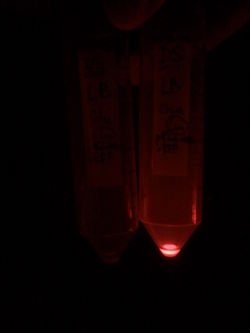Difference between revisions of "Part:BBa K914003"
Zmarinkovic (Talk | contribs) |
Zmarinkovic (Talk | contribs) (→Results) |
||
| Line 17: | Line 17: | ||
{|align="center" | {|align="center" | ||
|-valign="top" | |-valign="top" | ||
| − | |[[Image: | + | |[[Image:450px-Paris Bettencourt 2012 RG pRha photo 1.jpg|thumb|250px|center|<font size="1"><i>E.Coli</i> <b>The left tube:</b> cells were grown without L-rhamnose. <b>The right tube:</b> cells are grown in the present of 1% of L-rhamnose.</font>]] |
| − | |[[Image: | + | |[[Image:250px-Paris Bettencourt 2012 RG pRha photo 2.jpg|thumb|250px|center|<font size="1"><i>E.Coli</i> <b>The right tube</b> which was induced by L-rhamnose expresses RFP, while <b>the left tube</b> where we didn't add it, has no visible expression.</font>]] |
|} | |} | ||
Revision as of 15:16, 27 September 2012
L-rhamnose-inducible promoter (pRha)
L-rhamnose-inducible promoter is capable of high-level recombinant protein expression in the presence of L-rhamnose, it is also tightly regulated in the absence of L-rhamnose by the addition of D-glucose.
Characterization of pRha
We have submitted to the registry a new characterized promoter: pRha K914003.
Experimental setup
In order to characterize this promoter, we made a construct with a medium RBS (B0032) and an RFP ([]) cloned downstream of the pRha, on the pSB3C5 plasmid. We induced the expression of RFP by adding L-Rhamnose. As a negative control, we used cells without the inducer, as well as cells repressed with Glucose.
Results
First, by simple observation under a fluorescence viewer, we have seen that the addition of 1% L-Rhamnose leads to a significant expression of RFP after 10hours. The negative controls, where no Rhamnose was added, or when the promoter was repressed by Glucose, did not show any visible fluorescence. Both photos are taken after we centrifuged a culture of NEB Turbo strain with transformed plasmid. For the fluorescent result, the same tubes were photographed under excitation light (540nm), through an emission filter (590nm).
We quantified this result in a plate reader.
Next, we characterized the pRha promoter using a plate reader. We used different concentrations of L-Rhamnose (0.05%, 0.1%, 0.2%, 0.5% and 1%) and observed the resulting fluorescence over time. As negative controls, we used the non-induced cells, as well as cells repressed by 1% Glucose.
As we can see from the graph above, pRha promoter works as expected and it could be well tuned by concentration of L-rhamnose.
Sequence and Features
- 10COMPATIBLE WITH RFC[10]
- 12COMPATIBLE WITH RFC[12]
- 21COMPATIBLE WITH RFC[21]
- 23COMPATIBLE WITH RFC[23]
- 25COMPATIBLE WITH RFC[25]
- 1000COMPATIBLE WITH RFC[1000]




